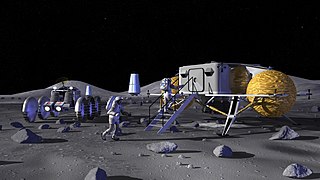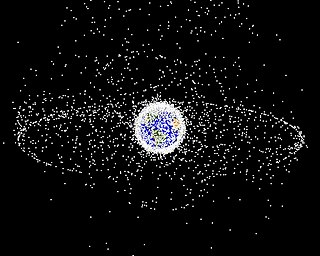
Harrison Hagan "Jack" Schmitt is an American geologist, former NASA astronaut, university professor, former U.S. senator from New Mexico, and the most recent living person—and only person without a background in military aviation—to have walked on the Moon.

Robert Zubrin is an American aerospace engineer, author, and advocate for human exploration of Mars. He is also an advocate for U.S. space superiority, writing that "in the 21st century, victory on land, sea or in the air will go to the power that controls space." and that "if we desire peace on Earth, we need to prepare for war in space."

Space exploration is the use of astronomy and space technology to explore outer space. While the exploration of space is currently carried out mainly by astronomers with telescopes, its physical exploration is conducted both by uncrewed robotic space probes and human spaceflight. Space exploration, like its classical form astronomy, is one of the main sources for space science.

Space colonization is the use of outer space for colonization, such as permanent habitation, exploitation or territorial claims. Extraterrestrial colonization is its broader form, including the use of celestial bodies, other than Earth, for colonization.

The Constellation program was a crewed spaceflight program developed by NASA, the space agency of the United States, from 2005 to 2009. The major goals of the program were "completion of the International Space Station" and a "return to the Moon no later than 2020" with a crewed flight to the planet Mars as the ultimate goal. The program's logo reflected the three stages of the program: the Earth (ISS), the Moon, and finally Mars—while the Mars goal also found expression in the name given to the program's booster rockets: Ares. The technological aims of the program included the regaining of significant astronaut experience beyond low Earth orbit and the development of technologies necessary to enable sustained human presence on other planetary bodies.

The Vision for Space Exploration (VSE) was a plan for space exploration announced on January 14, 2004 by President George W. Bush. It was conceived as a response to the Space Shuttle Columbia disaster, the state of human spaceflight at NASA, and as a way to regain public enthusiasm for space exploration.

Space law is the body of law governing space-related activities, encompassing both international and domestic agreements, rules, and principles. Parameters of space law include space exploration, liability for damage, weapons use, rescue efforts, environmental preservation, information sharing, new technologies, and ethics. Other fields of law, such as administrative law, intellectual property law, arms control law, insurance law, environmental law, criminal law, and commercial law, are also integrated within space law.

Colonization of the Moon is a process or concept employed by some proposals for robotic or human exploitation and settlement endeavours on the Moon. Settling of the Moon is, therefore, a more specific concept of lunar habitation, for which the broader concept of colonization is often used as a synonym, a use that is contested in the light of colonialism.

Space advocacy is supporting or advocating for a human use of outer space. The purposes advocated can be reached from space exploration, or commercial use of space to space settlement. There are many different individuals and organizations dedicated to space advocacy. They are usually active in educating the public on space-related subjects, lobbying governments for increased funding in space-related activities or supporting private space activities. They also recruit members, fund projects, and provide information for their membership and interested visitors. They are sub-divided into three categories depending on their primary work: practice, advocacy, and theory.

Asteroid mining is the hypothetical extraction of materials from asteroids and other minor planets, including near-Earth objects.

Colonization or settlement of Mars is the theoretical migration of humans to Mars and the establishment of long-term human presence on the planet. The prospect has garnered interest from public space agencies and private corporations and has been extensively explored in science fiction writing, film, and art. Organizations have proposed plans for a human mission to Mars, the first step towards any colonization effort, but thus far no person has set foot on the planet, and there have been no return missions. However, landers and rovers have successfully explored the planetary surface and delivered information about conditions on the ground.

A sample-return mission is a spacecraft mission to collect and return samples from an extraterrestrial location to Earth for analysis. Sample-return missions may bring back merely atoms and molecules or a deposit of complex compounds such as loose material and rocks. These samples may be obtained in a number of ways, such as soil and rock excavation or a collector array used for capturing particles of solar wind or cometary debris. Nonetheless, concerns have been raised that the return of such samples to planet Earth may endanger Earth itself.

Asteroids, including those in the asteroid belt, have been suggested as possible sites of space colonization. Motives include the survival of humanity, and the specific economic opportunity for asteroid mining. Obstacles include transportation distance, temperature, radiation, lack of gravity, and psychological issues.

The following outline is provided as an overview of and topical guide to space exploration.

NASA proposed several concept moonbases for achieving a permanent presence of humans on the Moon since the late 1950s. Research and exploration of the Moon has been a large focus of the organization since the Apollo program. NASA's peak budget was in 1964-1965, when it comprised 4% of all federal spending in service of the Apollo Moon landing project. Though lunar landings ever since the conclusion of the Apollo program in 1972 have ceased, interest in establishing a permanent habitation on the lunar surface or beyond low Earth orbit has remained steady. Recently, renewed interest in lunar landing has led to increased funding and project planning. NASA requested an increase in the 2020 budget of $1.6 billion, in order to make another crewed mission to the Moon under the Artemis program by 2025, followed by a sustained presence on the Moon by 2028. A crew was selected for the planned crewed mission, Artemis II, in April 2023.

The Space Exploration Initiative was a 1989–1993 space public policy initiative of the George H. W. Bush administration.

The politics of outer space includes space treaties, law in space, international cooperation and conflict in space exploration, international economics, and the hypothetical political impact of any contact with extraterrestrial intelligence.

Mars to Stay missions propose astronauts sent to Mars for the first time should intend to stay. Unused emergency return vehicles would be recycled into settlement construction as soon as the habitability of Mars becomes evident to the initial pioneers. Mars to Stay missions are advocated both to reduce cost and to ensure permanent settlement of Mars. Among many notable Mars to Stay advocates, former Apollo astronaut Buzz Aldrin has been particularly outspoken, suggesting in numerous forums "Forget the Moon, Let’s Head to Mars!" and, in June 2013, Aldrin promoted a crewed mission "to homestead Mars and become a two-planet species". In August 2015, Aldrin, in association with the Florida Institute of Technology, presented a "master plan", for NASA consideration, for astronauts, with a "tour of duty of ten years", to colonize Mars before the year 2040. The Mars Underground, Mars Homestead Project / Mars Foundation, Mars One, and Mars Artists Community advocacy groups and business organizations have also adopted Mars to Stay policy initiatives.

Humans have been present in space either, in the common sense, through their direct presence and activity like human spaceflight, or through mediation of their presence and activity like with uncrewed spaceflight, making "telepresence" possible. Human presence in space, particularly through mediation, can take many physical forms from space debris, uncrewed spacecraft, artificial satellites, space observatories, crewed spacecraft, art in space, to human outposts in outer space such as space stations. While human presence in space, particularly its continuation and permanence can be a goal in itself, human presence can have a range of purposes and modes from space exploration, commercial use of space to extraterrestrial settlement or even space colonization and militarisation of space. Human presence in space is realized and sustained through the advancement and application of space sciences, particularly astronautics in the form of spaceflight and space infrastructure.
Space ethics, astroethics or astrobioethics is a discipline of applied ethics that discusses the moral and ethical implications arising from astrobiological research, space exploration and space flight. It deals with practical contemporary issues like the protection of the space environment and hypothetical future issues pertaining to our interaction with extraterrestrial life forms.


















